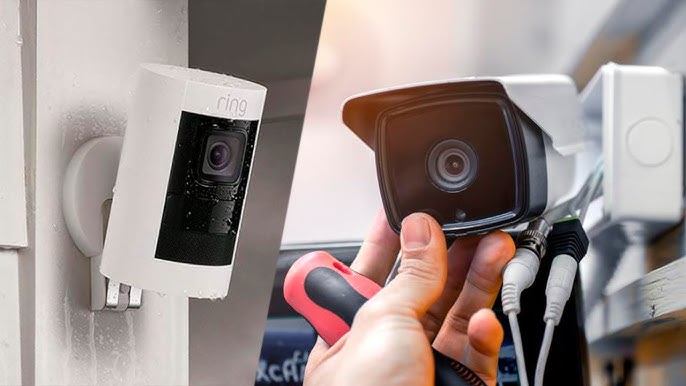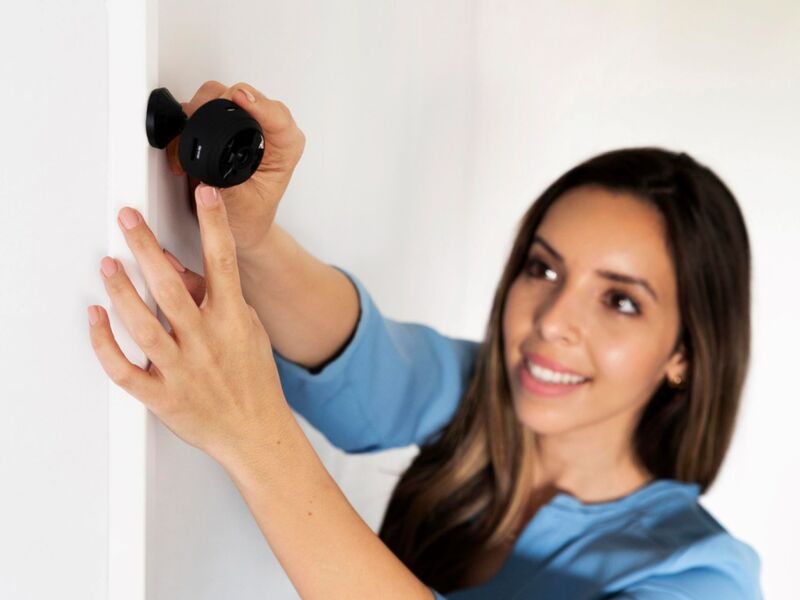It can seem like a lot depends on the home security cameras you choose. Find out which ones will help you reach your security goals and here we will see how to It can seem like a lot depends on the home security cameras you choose. Find out which ones will help you reach your security goals and here we will see to choose the security camera

Security cameras work if you’re worried about keeping your home safe. Some research has shown that cameras that are easy to see stop people from doing bad things. This is because the FBI says that most burglaries aren’t planned ahead of time; they happen when the chance arises.
Installing a home security system in Dubai is one approach to make sure that your property doesn’t look like a good target. That may include smart locks to keep your door safe, sensors to pick up on any strange behaviour, and security cameras to keep an eye on everything.
But how can you know which security camera is best for you? You can get cameras that are wired or wireless. Each one has its own set of benefits and cons that could make it a decent choice for you or a bigger pain than you thought.
In this Article we’ll explain the differences between wired and wireless security cameras and how to choose the security camera so you can pick the one that works best for you.
Wired home security cameras
A wired home security camera is one that is permanently connected to a power source. These cameras are usually placed around your home permanently or semi-permanently and are connected to a central hub that is the main part of your home security system. The wire gives electricity to the devices and lets them connect to the internet. It also lets them send data and video to a central point. In certain circumstances, this could be just one cord, such a power over Ethernet cable.
Pros
Depending on the system, a connected home security camera might keep a memory card on the camera or let you see it from afar. Usually, these systems use a digital video recorder to save video so it can be played back. In some circumstances, a coaxial cable is used to send video from the cameras to the main hub. Most of the time, these systems will also need a power line to keep the cameras attached.
Some connected cameras work with the internet, which lets you access them through a networked video recorder system. In this instance, PoE cables are usually used, and you can see the video from a distance.
Pros: Wired home security cameras are connected, so they always have a solid connection. This means that the video quality is usually only limited by what the camera can do. Because of this, connected wired home security cameras usually have higher video and audio quality.
Also, a wired security camera will have a more steady and reliable connection because it is plugged in directly and doesn’t need an internet connection to work. Your camera won’t go offline all of a sudden if the internet goes down. It can keep recording and sending the video to a central place.
These cameras don’t need to be connected to the internet, therefore they are less likely to be hacked or have other security holes. You don’t want your home security system to make it easier for people to invade your privacy. In this case, wired security cameras are less risky.
Cons
The “wired” element is the worst thing about a wired home security camera. You need to run wires from the central hub to where these cameras are positioned. Some estimates say that a four-camera system can cost up to 7000 AED to 8000 AED and take a lot of time. Most of the time, these systems need to be professionally installed.
Most wired home security systems are also hard to alter or move. If you put in a wired home security camera system, you should not be able to take it with you when you move. It costs a lot to uninstall it and then pay to have it installed in the new place. Most of the time, wired home security cameras stay in the same place where they were put up.
Another possible issue with connected home security cameras is that they can turn off when the power goes off. Most systems have a backup power source, such a battery, but they mostly need to be plugged in to work. You can lose your camera feed if the power goes out.
Wireless home security cameras
Wireless home security cameras are devices that send video and audio information over wireless technology such as Wi-Fi, providing greater flexibility and convenience of installation than cable systems. They are frequently used to monitor residential, commercial, and other buildings.
Some wireless cameras still need to be plugged in for electricity, although a lot of them are battery-powered and are often called “wire-free” cameras. Most of the time, wire-free cameras are turned on by a sensor and only record when they see something moving to save battery life. Most of the time, wireless systems that plug in are always-on systems.
Wi-Fi is how these wireless cameras connect. They can talk to a cloud server once they are connected to the internet. This is usually where they transfer video footage. Some systems let you broadcast this film so you can see it live, while others let you save it and watch it later. Some wireless cameras include built-in storage that can save some video, but the quantity that can be saved on an SD card or USB device is usually limited.
Most wireless home security cameras may link to other devices that are also connected to the internet. This makes it possible for them to work with smart home systems. Most of them work with smart assistants like Siri from Apple, Alexa from Amazon, or the Google Assistant.
Pros
Wireless home security cameras are easier to use because they are easy to install and set up. You won’t have to lay electrical wires through your house to attach them because they don’t need hardwiring like wired cameras do. You can plug them into an outlet or use a battery-powered camera that can go anywhere.
It’s also easy to add more wireless home security cameras for the same reason. Because of all the wiring and work that needs to be done to set them up, wired home security systems aren’t very flexible. A wireless system can have a lot of cameras because they’re cheaper and don’t need any setup to get them online.
Wireless home security cameras don’t need a central power source, thus they are more likely to keep working during a power loss that would shut down connected cameras. If the power goes out in your house, wire-free cameras will still work because they are powered by batteries.
Cons
It’s easy to set up and install wireless home security cameras, but their connection isn’t as stable. If your wireless network goes down or is unreliable for any reason, they are likely to lose their connection. When the internet goes down, you might not be able to see or use your camera.
Hackers can potentially get into wireless security cameras because they are always linked to the internet. You can take efforts to protect your privacy, but wireless security cameras can be used to assault your home.
Wireless home security cameras don’t need to be connected to a wired network, but they still need power. This could be a plug that is close by, which limits where you can put it, or batteries that need to be checked and changed over time. You will need to check that a wireless camera system is still functional and has power.
The type of home security camera system you want, wired or wireless, depends on what your home needs and what you expect from the system. A wireless security camera is probably the best choice for you if you want something cheap, flexible, easy to use, and easy to get to. If you want something that will last longer, has greater video quality, and can be seen all the time, a connected security camera can be a better choice for you. Think about everything before you make your choice.
Final Thoughts
When picking the right camera, you should think about a few important things, such as how easy it is to install, how reliable the signal is, and how much maintenance it will need in the long run.
Wired cameras are best for most instances where wiring is possible, especially if there is already a wired network in place. Wired is the best solution for businesses that need a system that is dependable and of excellent quality.
Wireless cameras might be better if you need to be able to move around and be flexible, especially if you have easy access to Wi-Fi or mobile service. Cellular cameras are the most flexible for places that don’t have Wi-Fi, but they cost more because you have to pay for data service contracts.
Think about how big and how the installation area is set up, what kind of video quality you need, and how often you will need to do maintenance or upgrades. Wired systems are more reliable in the long run, but they can be hard to set up. Wireless systems are easy to set up, but they may need more frequent checks on their connectivity and performance.
In the end, the ideal camera for you will depend on where you are and how you plan to use it. To get more insights on Wired security cameras and wireless security cameras visit Datalife showroom or Datalife website. Their professional approach will make it easy for you to make good decisions according to your requirements.
Check out Datalifeae.com for the best affordable home security cameras and indoor security cameras if you want additional ideas for how to keep your home safe. You’ll also find out where to put them.


